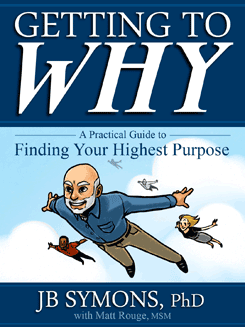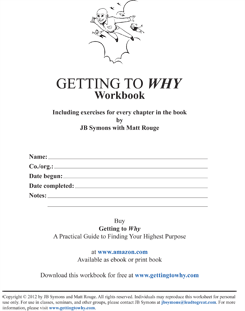Here are the table of contents and first chapter of Getting to Why.
CONTENTS
Introduction
ONE: UNDERSTANDING WHY
01. Why Why?
02. Pleasure and Satisfaction
03. Success and Failure
04. The Seven Areas of Life
05. Avoiding the Role Trap
06. Change
07. Wellness
PART TWO: ACHIEVING WHY
08. The Ladder of Fulfillment
09. The Three-Cylinder Engine of Personal Progress
10. Self-Esteem
11. Saying “No”
12. Fear and Doubt
13. Goals
14. Self-Succession Planning
15. Your Personal Legacy
PART THREE: SHARING WHY
16. Synergy
17. Trust
18. Direction
19. The Manager’s Role
20. The DAO Method
21. WIIFT? (What’s In It For Them?)
22. Delegation
23. Succession Planning
Epilogue
About the Authors
Workbook (in print version—download free workbook here)
Chapter One
Why Why?
Why is the mission question—the biggest and most important in your life. Why is not a complaint or a challenge to an argument; rather, it is a perception, a paradigm of high magnitude. Why begins deep within you, pushing and pulling you into the unknown, to the boundaries of your current understanding. Why is the beginning of consequential thinking.
Why can be physical, as when you look out at the stars and ponder Why the universe has taken the form it has.
Why can be mental, as when you wonder Why a particular mathematical proof is true.
Why can be emotional, as when you wonder Why you have fallen in love or out of love with someone.
Why can be spiritual, as when you ponder Why you exist.
Why seeks to define itself physically, mentally, emotionally, and spiritually in multiple forms because it desires an end point or at least a horizon. Why is purpose itself.
It’s time to check the compass of your life.
Why is the fifth point on the compass of your life; it’s the dot on the map that says, “You are here.” With it come 360 degrees of options. Why is the mantra of the pioneer because courage and initiative appear when you ask it, preparing you for the Who, What, Which, When, Where, How, and If of your journeys. Without Why, however, you are just a wanderer among life’s many choices.
Why is the first question you asked as a child. Like many of us, you may have received a poor, incomplete, or defensive response: “Because I told you so,” or, “Don’t ask questions—just do it!” (This was your first introduction to the poor management and supervisory techniques you have experienced in your life and may even use yourself.) These Whys of your early life were not only Whys of curiosity but were also Whys of passion. You really wanted to know Why!
The way you asked Why and handled the responses in your early childhood established your pattern of development and ultimately your path in life. You may have continued to ask questions and seek answers boldly regardless of negative feedback. You may have accepted a more cautious approach while continuing to ask and explore. Or you may have accepted the don’t ask, just do it response and faced life with your head down, looking up only when you ran into something.
You deserve to ask Why!
All human beings desire and deserve to struggle with the Whys of their lives. A child may ask, “Why is the sky blue?” A philosopher may ask, “Why are we here?” An employee may ask, “Why are we doing this, and Why are we doing it this way?” Everyone really wants to know Why.
In your heart, so do you. Can you accept that the right to ask Why is not something that you need to earn or can ever have taken from you? Whether you are in prison or a ten million dollar home, the question is yours to ask, and you were born with permission to do so.
I believe that the Higher Power desires us to ask Why and gives us permission to do so at any time in our lives: “Ask, and it shall be given you; seek, and ye shall find; knock, and it shall be opened unto you” (Matthew 7:7, King James Version).
The Chinese classic Dao De Jing begins (as translated by Matt), “The way that can be said to be the way is not the invariable way. The name that can be said to be the name is not the invariable name.” Similarly, Why may seem bigger than your ability to define it, and it may be frustrating at times to see and feel the end you seek. I promise you, however, that the journey is worth all the effort you will exert. You deserve your Whys—all of them.
The paradox of Why is that the starting point and ending point are the same: once you ask Why, you’re there. Yet Why is not a question to be asked once, but rather again and again. Your answers to Why will transform themselves as time passes, as circumstances change, and as you gain in knowledge and wisdom; and your destinations and experiences will become richer and deeper.
Working with Why leads you to your own highest purpose. Working against Why invariably puts you in a rut. To extend and transform the metaphor, a rut is a grave with both ends kicked out. If you don’t feel fulfilled in life, if you feel as though you’re barely alive to begin with, then what’s the risk in asking Why?
Why is you, Why is greater than you, and Why invites you to be greater than the current you. When you get to Why, your chances of achieving success, fulfillment, and peace increase dramatically. If you don’t get to Why—all bets are off.
Some questions to ponder.
If you’re ready, ask yourself the following: Why are you doing what you do today? Why are you associating with the people in your life? Why are you going in the direction you’re going?
Can you answer these questions with emotion and passion? If you cannot, you’ll have the first of many chances to ask yourself Why in the following pages. If you can, you’ll have the chance to enrich and move even deeper into your answers.
Although in this book you are encouraged to ask Why to discover your highest purpose, you can and should apply Why to less weighty matters as well. In fact, in tackling any problem or pursuing any opportunity, Why is the first question to ask.
The good news is that it’s possible to get to Why at any time in your life. It’s also possible to leave Why along the way and get back to it. This book provides concepts, examples, and tools to help you get to Why, whether for the first time or after a departure from it. Remember, you are never too young or too old to ask Why!
§ § §
Now that you’ve read the first chapter of the book, why not download the free workbook and answer the questions for Chapter One?



